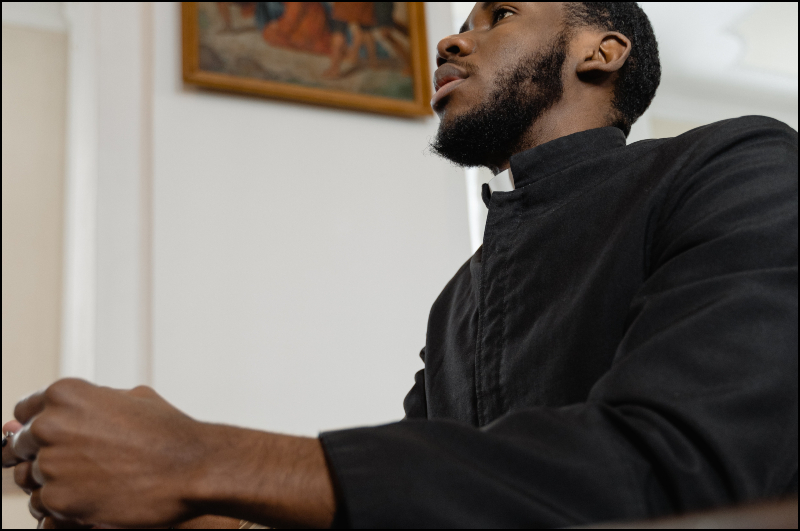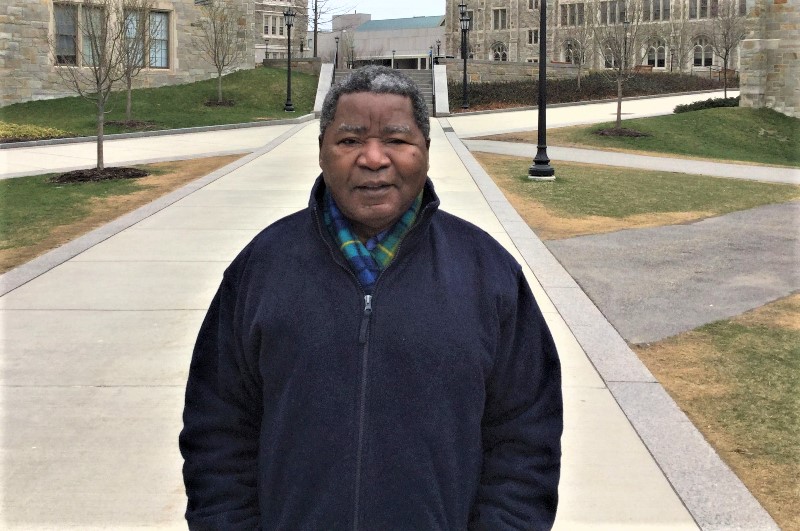

Saturday, 11th September 2021 is forever a memorable day for Hekima University College, not because of our solidarity with the 20th anniversary of the bomb attacks of the World Trade Centre in USA, but because of a tremendous colloquium on religious poverty in contemporary Africa.
Organized in the wave of the Ignatian Year, that all-day conference has been a golden opportunity to reflect and share experiences and prospects on poverty in general and the vow of poverty in particular. With the contributions of various speakers and the participation of a very significant audience, the colloquium tackled numerous aspects of religious poverty.
Beware of Indifference towards the Poor
In his opening remarks, father Jean-Luc Enyegue, SJ reiterated the fundamental call of Pope Francis: “Do not fall prey to indifference.” In a continent full of bad news (wars, diseases, disasters and so on), “how is religious poverty a good news for our fellow Africans today?” The Colloquium has tried to provide various answers to that question. It all started with the keynote speech of the principal of Hekima College, father John Okoria Ibhakewanlan, SJ. Reflecting on the topic “A Theologate by the Slum,” father John depicted the sad reality of our world which is experiencing a huge gap between the poor and the rich despite the immense resources and the claim of development, modernisation and globalization. Hekima College is not an exception as it is just located near a slum (Kibera) where not only poverty is striking but also violence, police brutality, health issues such as Covid-19. Given that alarming reality, what would Ignatius of Loyola do? How would the Holy Trinity react to the miseries that affect our neighbourhood? For father Okoria, “considering that the aim of teaching and learning is not only information but also transformation, Hekima community has tried to respond in various ways, materially, intellectually and spiritually.”
Learning from History and from Others
For the Jesuit scholastic Kachipapa Mayamiko, the 13th-century debate among early Franciscans on the vow of poverty is still pertinent because of its universal significance. That disputatio is still relevant today because the vow of poverty is not simply a question of piety. Consequently, the lessons that can be drawn from that debate for Africa are among others: to engage ourselves with our socio-political and juridical context; and elaborate alternative models for an updated understanding of the vow of poverty.
Taking also advantage of the treasure of Church history, father Oscar Nduri, SJ and Sister Irene Ogutu, FSSA engaged themselves in a fruitful dialogue which put at stake the different viewpoints of Jesuits and Franciscans on poverty. Despite some divergences, our speakers are convinced that both religious orders have common points and can learn from each other.
From history to a Quest for a New Paradigm
The Montfortian Seminarian Alex Muhwezi and the Jesuit Scholastic Pascal Bihorobusa collaborated in “Re-thinking the Vow of Religious Poverty in Contemporary Africa.” For them, the reality of poverty and Africa, the traditional African values and the lifestyle of religious are not always in symphony. The vow of poverty is so often questioned and even considered a contradiction and a pretention by our fellow Africans. In such a context, there is a quest for a new paradigm that will encompass both the theological and spiritual basis of the vow of poverty and the African identity as well. The aim of the paradigm is certainly to bring about a religious lifestyle which is meaningful and relevant to our brothers and sisters in the continent. This is also a call to rediscover the prophetic character and the authenticity of the vow of poverty on which Francis Aziza, SJ elaborated. Such authenticity lies in witnessing to the Gospel through concrete actions for the poor in Africa today. If the new paradigm aims at working with the poor, then one needs to know who those poor are. This was the main interest of father Mahasedra Ratsimbarison, SJ. Using a biblical approach, he presented different types of poor both in the Old and New Testaments. For him, the poor refer to vast categories of people depending on the context. He concluded that the most important thing is not to know who the poor are but to minister to them in concrete ways. This is what Jesuits do by educating the poor and journeying with the refugees in Africa.
Educating the Poor
The Jesuit Spanish Father, Dani Villanueva, SJ shared his thoughts in an inspiring video. His starting point is the conviction that “religious poverty when lived is a sign of credibility.” For him, “our poverty implies contact with poor at all levels.” Two important Jesuit organizations epitomize the closeness of Jesuits to the poor: Jesuit Refugee Service (JRS) and Fe y Algria (Faith and Joy). Insisting particularly on Fe y Algria, father Dani displayed the different Jesuit endeavours in favour of many poor students in various countries in the world especially in Latin America and Africa. On the later in particular, father Etienne Mborong, SJ insisted on the benefits of Jesuit education for the poor in Guinea Conakry. Such education intends to tackle the “anthropological poverty,” a concept forged by the late Jesuit father Engelbert Mveng to describe the lack of the sense of living and of self-esteem affecting the dignity of many Africans. To achieve its goals, “Fe y Alegria is itself a paradigm and methodology which transforms poverty into an opportunity of development.” Concretely, we are being challenged to open our best Jesuit schools in Africa to the poor too and to offer them a quality education that will enhance their entrepreneurial and innovative skills and capacities. Jesuits are then called to invent or re-invent a more suitable educational system that can help both African governments but also the people, especially the poor. That educational curriculum should be based on the conviction that people have to be educated to care for themselves ‘educare’ and to be educated for actions ‘educ-action’.
Journeying with the Refugees in Africa Today
Concerning JRS in Africa today, Mister André Atsu and father Eric Goeh-Akue, SJ insisted on the various activities achieved by JRS to alleviate the sufferings of our brothers, sisters, parents and children who are qualified as “refugees” or “forcibly displaced persons.” Concretely, JRS insists on “being with and doing with” rather than “doing for” the refugees. This is possible by journeying and accompanying them, showing them compassion, being and living with them. In general, JRS offers them opportunities for livelihoods, mental health and psychosocial support, reconciliation and social cohesion, advocacy for their rights and a quality education that secures their future by restoring their dignity.
Keeping our Faith Strong Despite the Suffering
The Rector of Hekima College chose also to reflect theologically on a practical matter linked to the question of poverty: the reality of human willed suffering. For father Deogratias Rwezaura, SJ suffering raises thoughts with regard to God’s existence and care. However, suffering can also be a reason to turn to God, an occasion to discover God’s presence in the person suffering. Fortunately, there are poor and suffering people who have come to the experience of “believing even when the future seems bleak.” We cannot have all the answers to the mystery of suffering. Nevertheless, faith is one answer to it and Job is an example in that sense. It seems that the greatest dilemma is not our lack of faith but “the apparent silence of God and the silence (inactivity) of humanity when suffering strikes us.” Father Deogratias made it clear that “in Jesus Christ, God is with us, suffers with us and strengthens us in our sorrows.” What is more questionable then is our “lack of solidarity” and our “apathetic silence” which are clear signs that we need conversion. We need to follow Jesus calling us to engage with all the situations of suffering and abject poverty such as genocide, wars, violence, refugee’s camps etc. This means that “the human institutions have to become mediators of God’s grace.” The grace of God is understood here as “Christ’s Spirit at work through human institutions and persons.”
Learning from our Failures and Mistakes
The Special Guest of the Colloquium, father Juan Antonio Guerrero Alves, SJ who is the Vatican Prefect of the Secretariat for Economy, shared his experience of Jesuit poverty. For him, “Jesuit poverty is to be generous by putting our talents and gifts to the service of our community and to our brothers and sisters.” Jesuit poverty “is to count more on divine providence than on human success.” Deep relationship with God leads us to avoid the “ideological poverty” which is to work for the poor in general but not in particular; to be expert of poverty in theory while refusing to engage with the concrete situation of the poor. For Father Guerrero, “our apostolic credibility depends on poverty. It is not a matter of power and wealth. If we are well protected, it will be difficult to be a witness. Our poverty is apostolic and the external way of living poverty through simplicity is vital. That poverty leads to indifference.” Concretely, he suggests “realism” as an attitude of immersion in the realities of the ground.
Finally, drawing from his experience of being at the service of the finances of the Church, father Guerrero made it clear that the Church has to learn from the errors and the mistakes of the past concerning financial issues. He gave various tips and hints to foster a spirit of stewardship, transparency, accountability, care, trustworthiness and professionalism in financial issues concerning the Church and religious organizations.
The Colloquium was closed officially by the final remarks by the most reverend father Orobator Agbonkhianmeghe, SJ President of the Jesuit Conference of Africa and Madagascar (JCAM). He expressed his gratitude to the Ignatian year committee of Hekima community for the organization of the conference and to all the presenters for their brilliant insights. In concluding, father Orobator drew the attention of the audience on some important considerations. First of all, there is an important question: how do we differentiate a poor person from other people? - “A Poor person do not talk on poverty. They do not have the luxury of discussing on poverty. Talking about poverty is not as same as living poverty or journeying with the poor in the field.” Secondly, inspired by Pope Francis, father Orobator insisted that “we cannot know poverty from distance.” He reiterated the two hints and tips given by Pope Francis to live concretely our life of poverty with the poor today:
1. Recognise and come closer;
2. Respond concretely and immediately.
The recommendation of Pope Francis echoes the gentle reminder of late Father General Adolfo Nicolás that “direct contact with the poor is the climax of our religious poverty.” Father Adolfo often asked himself and worried about the decrease in number of religious communities of immersion or proximity with the poor. “Friendship with the poor is lacking in our lifestyle today.” Finally, father Orobator considers the Colloquium as a successful event which prepares the ground for the reflection on our way of living religious poverty today suggested by the Superior General, father Arturo Sosa, SJ.
Select Payment Method
Pay by bank transfer
If you wish to make a donation by direct bank transfer please contact Fr Paul Hamill SJ treasurer@jesuits.africa. Fr Paul will get in touch with you about the best method of transfer for you and share account details with you. Donations can be one-off gifts or of any frequency; for example, you might wish to become a regular monthly donor of small amounts; that sort of reliable income can allow for very welcome forward planning in the development of the Society’s works in Africa and Madagascar.
Often it is easier to send a donation to an office within your own country and Fr Paul can advise on how that might be done. In some countries this kind of giving can also be recognised for tax relief and the necessary receipts will be issued.


